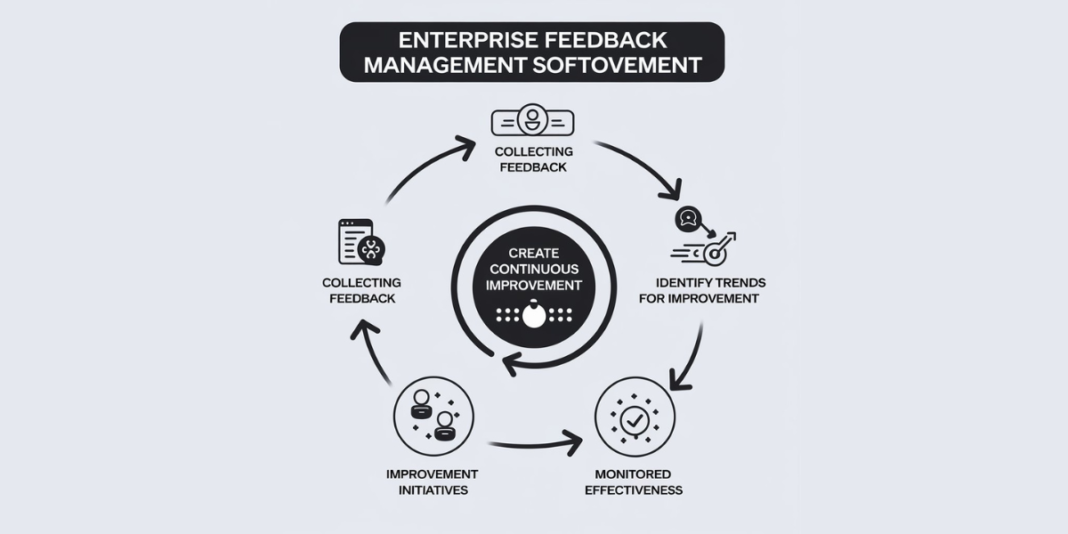In today’s fast-paced business environment, staying attuned to customer needs and employee feedback is critical. Enterprise Feedback Management (EFM) software has emerged as a powerful tool to help organizations gather, analyze, and act on insights effectively. This article explores why EFM enterprise feedback management systems are essential for sustainable growth.
What Is Enterprise Feedback Management Software?
Enterprise Feedback Management software is a comprehensive system designed to collect and manage feedback from various stakeholders, including customers, employees, and partners. Unlike traditional survey tools, EFM software centralizes feedback across multiple channels, offering actionable insights in real-time.
By leveraging EFM feedback, businesses can enhance customer satisfaction, optimize employee engagement, and make data-driven decisions that propel growth.
Why Feedback Is Crucial For Business Growth
Feedback serves as a mirror for businesses, reflecting strengths and areas of improvement. Ignoring feedback can lead to customer dissatisfaction, low employee morale, and stagnation.
EFM systems empower organizations by:
- Capturing insights at critical touchpoints.
- Identifying patterns and trends.
- Enabling proactive responses to challenges.
In essence, feedback drives continuous improvement and aligns business strategies with market demands.
Key Features of EFM Enterprise Feedback Management Software
1. Centralized Feedback Collection
EFM software integrates multiple feedback channels, including emails, surveys, social media, and web forms, into a unified platform. This eliminates silos and provides a holistic view of stakeholder sentiments.
2. Advanced Analytics
Modern EFM tools use AI and machine learning to analyze feedback. They generate detailed reports and identify trends, sentiment, and potential areas of concern.
3. Customization And Scalability
EFM systems can be tailored to meet specific business needs, whether for small teams or large enterprises. Scalability ensures the software grows with your business.
4. Real-Time Reporting
The ability to access feedback in real-time empowers businesses to make timely decisions, address issues quickly, and capitalize on opportunities.
How EFM Feedback Improves Customer Experience
Understanding Customer Preferences
With EFM software, businesses can dive deep into customer behavior and preferences. This helps create personalized experiences, fostering loyalty and repeat business.
Addressing Pain Points
By analyzing customer feedback, companies can identify and resolve recurring issues, ensuring a smoother customer journey.
Strengthening Brand Reputation
Satisfied customers are more likely to recommend a brand. EFM feedback provides actionable insights to maintain high satisfaction levels and improve brand perception.
Boosting Employee Engagement With EFM
Employee feedback is as vital as customer feedback. An engaged workforce drives productivity, innovation, and customer satisfaction.
Encouraging Open Communication
EFM systems make it easy for employees to share opinions anonymously, fostering trust and openness.
Identifying Workplace Challenges
Analyzing employee feedback helps HR teams pinpoint areas needing improvement, such as workplace culture or management practices.
Improving Retention Rates
Satisfied employees are less likely to leave. EFM insights help organizations create a positive environment that supports employee well-being and growth.
The Role Of EFM In Data-Driven Decision Making
EFM enterprise feedback management systems empower decision-makers with actionable insights.
Tracking Key Metrics
EFM software tracks Net Promoter Scores (NPS), Customer Satisfaction Scores (CSAT), and Employee Engagement Scores (EES), helping businesses measure performance.
Prioritizing Initiatives
With a clear understanding of stakeholder needs, businesses can prioritize initiatives that deliver the highest ROI.
Reducing Risk
Proactive feedback management helps identify potential risks early, enabling swift corrective action.
Industries Benefiting From Enterprise Feedback Management
1. Retail And E-commerce
Retailers use EFM feedback to optimize customer experiences, refine product offerings, and improve service delivery.
2. Healthcare
EFM systems in healthcare enable providers to gather patient feedback, improve care quality, and enhance patient satisfaction.
3. Education
Educational institutions leverage EFM to understand student and faculty needs, ensuring a better learning environment.
4. Hospitality
Hotels and restaurants use EFM to gather guest feedback, ensuring a memorable experience and fostering loyalty.
Choosing The Right Enterprise Feedback Management Software
Selecting the right EFM software is critical for maximizing its benefits. Consider the following:
- Integration: Ensure compatibility with existing tools and platforms.
- Ease of Use: Choose a system that is user-friendly for both administrators and respondents.
- Cost: Opt for a solution that offers value for money without compromising on features.
- Support: Reliable customer support is essential for smooth implementation and ongoing usage.
Common Challenges In Feedback Management
Despite its advantages, feedback management comes with challenges:
1. Low Response Rates
Encouraging stakeholders to provide feedback can be difficult. Offering incentives or simplifying surveys can help.
2. Overload of Data
Too much feedback can overwhelm teams. EFM analytics simplify data interpretation by highlighting key insights.
3. Resistance to Change
Adopting new systems can face resistance. Proper training and communication ease the transition.
Best Practices For Implementing EFM Systems
Start Small
Begin with a pilot project to test the system and gather initial feedback.
Engage Stakeholders
Involve key stakeholders in the selection and implementation process to ensure alignment.
Act on Insights
The true value of EFM lies in action. Regularly review feedback and implement changes to demonstrate commitment.
Future Trends In EFM Enterprise Feedback Management
1. AI-Powered Insights
Artificial intelligence will continue to play a significant role in automating feedback analysis.
2. Multi-Channel Integration
Future EFM systems will offer even better integration with emerging channels like chatbots and IoT devices.
3. Enhanced Personalization
Businesses will use EFM to deliver hyper-personalized experiences based on individual feedback.
What is enterprise feedback management software?
Enterprise feedback management software is a platform that collects, organizes, and analyzes feedback from stakeholders to improve business processes and decision-making.
Why is EFM important for business growth?
EFM helps businesses enhance customer and employee satisfaction, improve processes, and make data-driven decisions, driving sustainable growth.
How does EFM improve customer experience?
EFM provides insights into customer preferences and pain points, enabling businesses to deliver personalized, high-quality experiences.
Can small businesses benefit from EFM?
Yes, small businesses can use scalable EFM systems to understand customer needs and improve service quality.
What are the key features of an EFM system?
Key features include centralized feedback collection, advanced analytics, real-time reporting, and customization.
How does EFM boost employee engagement?
EFM encourages open communication, identifies workplace challenges, and helps create a positive work environment.
Conclusion
Enterprise Feedback Management software is more than a tool; it’s a growth enabler. By centralizing feedback, providing actionable insights, and fostering continuous improvement, EFM empowers businesses to meet and exceed stakeholder expectations. Investing in the right EFM system and feedback management software ensures that your organization stays competitive in today’s dynamic market.




